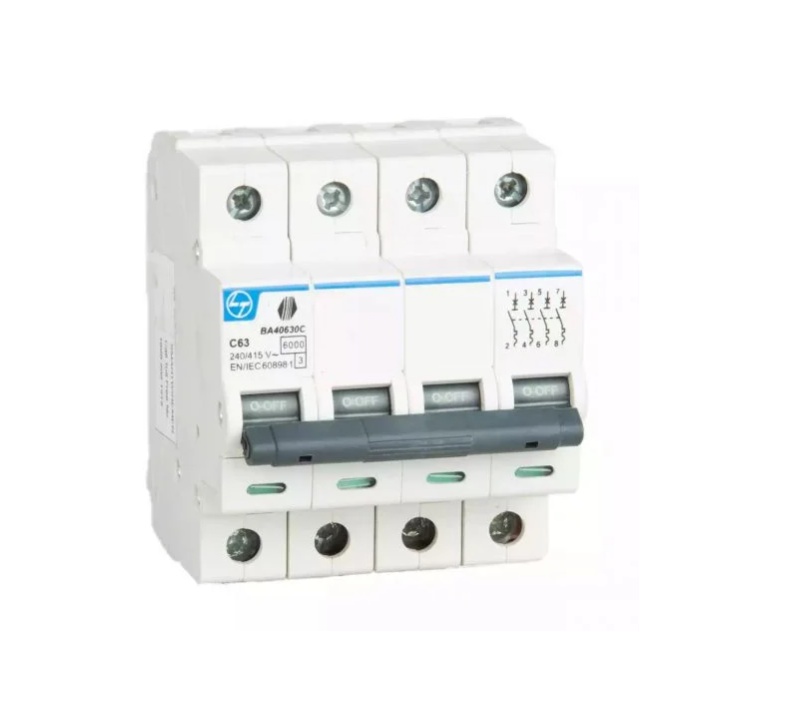In the field of electrical safety and circuit protection, Earth Leakage Circuit Breakers (ELCBs) and Miniature Circuit Breakers (MCBs) play pivotal roles. They are essential components in electrical systems, designed to safeguard against faults, overloads, and electrical hazards. In this comprehensive guide, we will delve into the functionalities, differences, and applications of Earth Leakage Circuit Breakers and Miniature Circuit Breakers, shedding light on their importance in ensuring safe and reliable electrical installations.
Earth Leakage Circuit Breakers (ELCBs)
Earth Leakage Circuit Breakers, also known as Ground Fault Circuit Interrupters (GFCIs) in some regions, are specialized devices designed to protect against electric shock by detecting ground faults. These faults occur when current leaks from an electrical circuit and flows to the ground or earth, potentially posing a serious hazard to individuals and property. ELCBs function by constantly monitoring the flow of current between the live conductors and the earth wire.
Working Principle of ELCBs
- Detection of Current Imbalance:
ELCBs continuously compare the incoming and outgoing currents in a circuit. If there is an imbalance, indicating leakage to the ground, the ELCB quickly trips to disconnect the circuit.
- Tripping Mechanism:
When a ground fault is detected, the ELCB's internal mechanism swiftly opens the circuit, cutting off the power supply to prevent electric shock.
- Sensitive to Low Currents:
ELCBs are sensitive devices capable of detecting even small leakage currents, typically in the range of milliamperes (mA).
Types of ELCBs
- Voltage-Operated ELCBs (VOELCBs):
These types of ELCBs detect voltage imbalances between the live conductors and the ground. They are sensitive to current leakage but less prone to nuisance tripping due to load currents.
- Current-Operated ELCBs (COELCBs):
COELCBs operate based on the principle of current imbalance between the live conductors and the ground. They are highly sensitive to leakage currents and offer effective protection against electric shock.
Miniature Circuit Breakers (MCBs)
Miniature Circuit Breakers are compact and versatile devices used for circuit protection against overloads and short circuits. They are widely employed in residential, commercial, and industrial settings to ensure the safety of electrical systems and prevent damage to equipment. MCBs are capable of quickly interrupting the flow of current when abnormalities such as overloads or short circuits occur.
Working Principle of MCBs
- Overload Protection:
MCBs monitor the current flowing through a circuit. When the current exceeds the rated capacity of the MCB, indicating an overload, the breaker trips to disconnect the circuit.
- Short Circuit Protection:
In the event of a short circuit, where a sudden surge of current occurs, the MCB responds instantly by tripping to prevent damage to the circuit and connected devices.
- Resetting Mechanism:
After a trip event, MCBs can be manually reset by flipping the breaker handle to the "off" position and then back to the "on" position.
Types of MCBs
- Single Pole MCBs:
These protect a single phase or line in a circuit. They are commonly used in residential installations for lighting circuits and power outlets.
- Double Pole MCBs:
Double pole MCBs protect both the live and neutral wires in a circuit. They are suitable for appliances and equipment that require additional protection.
- Three Pole and Four Pole MCBs:
These MCBs are designed for three-phase electrical systems, offering protection for all three phases and the neutral wire.
Differences Between ELCBs and MCBs
While both ELCBs and MCBs serve the critical function of protecting electrical circuits, they differ in their primary purposes and methods of operation:
- Functionality:
- ELCBs: Designed to detect ground faults and provide protection against electric shock due to current leakage to the earth.
- MCBs: Primarily used for protection against overloads and short circuits, ensuring the safety of electrical systems and equipment.
- Detection Method:
- ELCBs: Monitor current imbalance between live conductors and the ground, tripping when leakage is detected.
- MCBs: Monitor the current flowing through a circuit, tripping in response to overloads or short circuits.
- Sensitivity:
- ELCBs: Highly sensitive to low levels of leakage current, typically in the range of milliamperes (mA).
- MCBs: Designed to trip at specific current levels above the rated capacity, such as during an overload or short circuit.
- Applications:
- ELCBs: Commonly used in areas where protection against electric shock is paramount, such as in bathrooms, kitchens, and outdoor installations.
- MCBs: Widely employed in residential, commercial, and industrial settings to protect circuits, appliances, and equipment from damage.
Importance and Applications
Importance of ELCBs:
- Protection Against Electric Shock: ELCBs are crucial for preventing electric shock accidents by quickly disconnecting the circuit in the presence of ground faults.
- Safety in Wet Areas: In areas prone to moisture, such as bathrooms and kitchens, ELCBs provide essential protection against potential hazards.
Importance of MCBs:
- Equipment Protection: MCBs safeguard electrical equipment, appliances, and devices from damage caused by overloads and short circuits.
- System Reliability: By promptly interrupting faulty circuits, MCBs contribute to the reliability and uninterrupted operation of electrical systems.
Applications:
- Residential Installations: Both ELCBs and MCBs are integral components in residential electrical panels, protecting circuits, appliances, and occupants from electrical hazards.
- Commercial Buildings: In commercial settings such as offices, retail spaces, and hospitals, ELCBs and MCBs ensure safety and reliability in electrical installations.
- Industrial Settings: ELCBs and MCBs play vital roles in protecting machinery, equipment, and personnel in industrial environments.
Read Also - MCB (Miniature Circuit Breakers) Guide - Types, Sizes, And Uses
Conclusion
Earth Leakage Circuit Breakers (ELCBs) and Miniature Circuit Breakers (MCBs) are indispensable devices in modern electrical systems, each serving distinct but vital purposes. While ELCBs focus on detecting ground faults to prevent electric shock, MCBs provide protection against overloads and short circuits, safeguarding equipment and ensuring system reliability.
So, the next time you flip a switch or reset a circuit breaker, remember the critical roles that Earth Leakage Circuit Breakers and Miniature Circuit Breakers play in keeping electrical systems safe, functional, and protected against potential hazards.


No comments yet